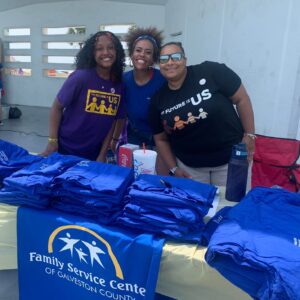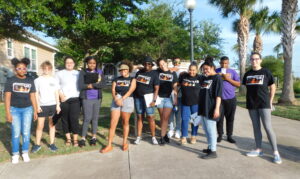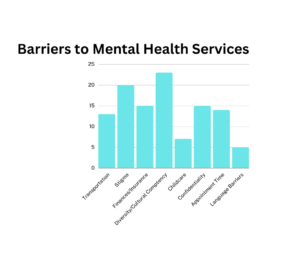This piece was written by Shanice Blair, Communities of Care co-coordinator at The Future is US, grantee partner of the Hogg Foundation. It has been edited for length and clarity. The views expressed in this post are the author’s and do not represent those of the Hogg Foundation.
Community resources are typically created with historically under-resourced communities in mind. These communities are also most significantly impacted by changes in policy and law. Yet members of these communities are too often the ones without a seat at the table when resources, policies, and laws are established.
It’s time to recognize community members as the experts in their communities. Effective and sustainable community-level change can’t and won’t happen unless community members are actively involved in the decision and policy-making process.
They are the ones who live, work, play, and pray in their community. They are the ones who experience the hardships found in their community. And they are the ones who are most aware of the community-level factors leading to these hardships and their impact on health and wellness.
They also know how to solve problems in their community. Unfortunately, they often lack the opportunities, tools, and support they need to do so. But in the historically under-resourced Galveston Independent School District (GISD) community, The Future is US initiative is working to make these much-needed resources available.
The Future is US
The Future is US initiative (TFIU) is funded by a Hogg Foundation Communities of Care grant, a five-year, $11.5 million initiative that supports collaborative approaches to well-being in the greater Houston Metropolitan Area with a focus on children and youth of color and their families. Its goal is to strengthen efforts to transform the environments where people live, learn, work, play, and pray to support resilience, mental health, and well-being.
Our initiative focuses specifically on dismantling the “school-to prison-pipeline” in GISD, where Black students are suspended three to six times more often than their non-Black peers. We focus on building community and fostering collaboration by turning to the experts on this issue, our Black youth and families. In particular, through the Youth and Parent Advisory Council, TFIU helps them to amplify their voices, recognize their rights, and lead the way to finding solutions.
Growing Critical Consciousness
Just by bringing awareness to an issue and putting a name to it, a community’s “critical consciousness” grows. Community members begin to recognize, analyze, and take action against oppressive and disempowering systems that impact them. The ability to put a name to the issue also takes the blame off the individual and puts it where it belongs – on the system of oppression.
Clara Miller, a mother in the GISD community, experienced first-hand this growth of critical consciousness. After attending an TFIU presentation that explained the school to prison pipeline, she began to reflect on her children’s experiences in the school district. She then joined our initiative and began attending parent advocacy trainings provided by the Honey Brown Hope Foundation.

Parent and Youth Lead Advocates Clara Miller and Toniesha Martinez with Shanice Blair. Credit: The Future is US.
Clara learned how to advocate for her children, protect them from discriminatory disciplinary policies, and respond to school administrators if her children experience excessive and wrongful punishment again. She is now the Parent Lead Advocate for our Parent Advisory Council, where she shares her story and organizes other GISD parents and youth as an agent of change.
TFIU continues to raise awareness and critical consciousness in community engagements incorporating the Talking and Acting for Health Justice program, created by a Communities of Care collaborator. Through this program, we strive to have conversations on the ways race and racism influence the community’s health and well-being.
TFIU youth have also found creative ways to raise critical consciousness. Taking to The Strand, a popular pedestrian district in Galveston, they conducted video interviews with passersby about the School to Prison Pipeline. The resulting YouTube video, “What is the School to Prison Pipeline?” reveals the dire need to continue raising awareness around the issue.
Listening to Community Voices
We have also addressed the issues of suicide and suicide prevention. After a father in the community died by suicide, a community leader reached out for help finding local mental health support for Black community members in an effort to prevent more families from experiencing such devastating loss.
As a result, we created the Soul Food Sessions and Questionnaire to start the conversation on how to improve Galveston’s mental health resources so that they better fit the needs of the Black community. Feedback from the questionnaire revealed that Black Galvestonians want to talk about mental health issues. They want more resources available locally and more diversity and cultural competence in local providers and services.
The questionnaire also helped identify barriers to accessing mental health resources, including cost, lack of diversity, stigma, and concerns about confidentiality. By sharing this feedback with our partners who are mental health service providers, we were able to help them adapt and improve their services to better meet the specific needs of Black Galvestonians.
Finally, our Soul Food Sessions provided opportunities for the community to discuss and learn about issues of greatest concern to them, including anxiety, depression, self-care, and anger management.
We know that community members are the experts on solving problems within their own community. That’s why The Future is US partners with them, listens to them, and offers them the opportunities, tools, and support they need to do just that.
Related Content
- The Future is US
- TFIU Policy Brief: Reducing Racial Inequalities in School Discipline
- TFIU Newsletter
- TFIU Facebook
- Video: “What is the School to Prison Pipeline?”
- Young Minds Matter: Transforming Our Communities Collectively
- Community Implementation: Community Centered Approach to Well-Being
- Young Minds Matter: Healing, Justice, and Connection for Mental Well-Being
- Into the Fold Episode 5: Dr. Delia Sanchez: Seeing Through the Lens of Cultural Competence
- Declaration of Racism as a Mental Health Crisis


